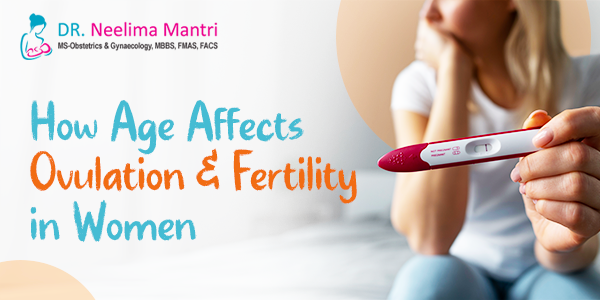
by Dr Neelima Mantri | Dec 10, 2025 | Blog, Female Gynaecologist
Fertility is shaped by many factors, but a woman’s age remains one of the most important. As the years pass, subtle changes begin to affect ovulation and reproductive capacity. These changes are biological and cannot be paused. Many women learn about them only after trying to conceive without success. That is why awareness is vital. Knowing how your age may affect fertility can help you take steps at the right time.
How a Woman’s Age Influences Ovulation
Ovulation happens when the ovaries release a mature egg. In the early twenties, most women ovulate regularly. This makes it easier to conceive during that phase of life. But as a woman moves into her thirties, hormone levels start to shift. Some cycles may not include ovulation at all, even when periods appear normal.
The ovaries begin to respond less to signals from the brain. As a result, ovulation becomes less predictable. This shift is not sudden. But it makes it harder to conceive as you grow older. Understanding how age affects ovulation and fertility in women allows you to prepare rather than panic.
Age-Related Decline in Egg Quantity and Quality
Each woman is born with a limited number of eggs. That number begins to fall right from birth. By puberty, the egg count is already lower. In the twenties and early thirties, enough good-quality eggs remain to support pregnancy.
By age 35, both egg quantity and quality drop more sharply. Older eggs are more likely to have chromosomal problems. This may result in failed implantation or miscarriage. Even if the woman is otherwise healthy, poor egg quality can reduce her chances of a full-term pregnancy. This is a natural part of female reproductive health and ageing.
Fertility Challenges After 30, 35, and 40
Fertility does not collapse overnight. But the chances of getting pregnant change with time. In the early thirties, conception may take longer. After 35, the decline becomes more visible. It may take months instead of weeks. Some women may need medical advice even if they have regular cycles.
By 40, the chances of natural pregnancy become lower. At this stage, some women also face problems like fibroids or hormonal imbalances. If you are wondering when does fertility decline in women, the answer often lies between 30 and 35. Beyond that, extra support may be necessary.
Ways to Support Fertility at Different Ages
There are steps you can take at any age. Eating well, staying active, and tracking your cycles can all make a difference. Reducing alcohol and quitting smoking can also help preserve fertility. Women above 30 should consider basic tests to assess hormone levels and egg reserve.
Those trying to conceive after 35 may benefit from speaking to a specialist. For example, a female fertility doctor in Mumbai can suggest tests or treatments. If needed, female infertility treatment in Mumbai is available for women who want to explore assisted methods. Early action gives better control.
If you are looking for practical support, start by reading fertility tips for women over 30 and create a plan that suits your body and lifestyle.
Conclusion
The best age for pregnancy depends on many things, but your body works on a natural timeline. Fertility starts to decline slowly after the age of 30 and more quickly after the age of 35. By knowing what you’re looking for, you can take steps to protect your chances. Whether through changes in your lifestyle or the advice of professionals, staying informed helps you act with confidence when the time is right.
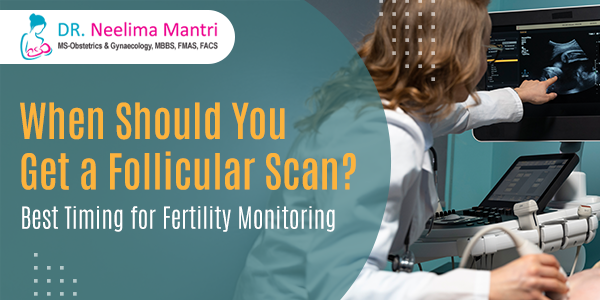
by Dr Neelima Mantri | Oct 16, 2025 | Blog, Female Gynaecologist
A follicular scan helps track ovulation in real time so you can plan your pregnancy with greater accuracy. Many women often ask, “When should I get a follicular scan?” Because timing decides how useful the scan will be for fertility planning. The process maps egg growth and shows when your body is ready to release a mature egg.
Understanding Why Follicular Scans Matter
Each month, your ovaries prepare follicles that carry developing eggs. A follicular scan measures their size and growth to see when one becomes dominant. It helps your doctor find the answers to the fundamental question “What is the right time for fertility monitoring?”. So your chances of conception improve naturally or through treatment. The test is non‑invasive and safe for all age groups.
Best Time to Begin the Scan
The best time for a follicular scan depends on your menstrual cycle length. Most doctors begin scanning between the eighth and tenth day of your period. You may need repeat sessions every two or three days until ovulation occurs. This allows the doctor to identify the most fertile phase with precision and prevent missing the ovulation window.
How the Procedure Tracks Ovulation
The scan uses an internal ultrasound that gives a clear image of your ovaries. Each session records how follicles mature and prepares you for ovulation. The images show if the egg is ready to release. This makes the best time for a follicular scan easier to predict for your next cycle, too.
Why Timing Is Key in Fertility Monitoring
The right will help your doctor to match your fertile period with your natural hormone cycle. The ovulation usually takes place mid-cycle of a normal cycle. Follicle monitoring at this stage will enable you to know whether your body is working as expected. It also gives the answer to the question of when is the right time to monitor fertility? with the right medical information as opposed to speculation.
Benefits of a Timely Follicular Scan
- Tracks the development of eggs in real time.
- Ovulation can be checked visibly.
- Organises sex or fertility therapy.
- Determines any abnormal or delayed ovulation.
- Feel assured during your fertility process.
Finding the Right Expert for the Scan
You will be guaranteed the continuity of your follicular monitoring and its interpretation by choosing the most qualified female gynaecologist in Mumbai. Not only will an experienced Gynaecologist in Mumbai scan, but they will also explain the findings. It is also targeted at sensitising you to the pattern of your body in order to make good fertility decisions.
Personalised Guidance for Better Results
If you are trying to conceive and wondering when to get a follicular scan? It helps to consult a specialist early. Regular tracking gives you control over timing and clarity about your cycle.
For expert fertility care and precise follicular monitoring, consult Dr Neelima Mantri, the best female gynaecologist in Mumbai, known for guiding women through every stage of fertility management with accuracy and care.
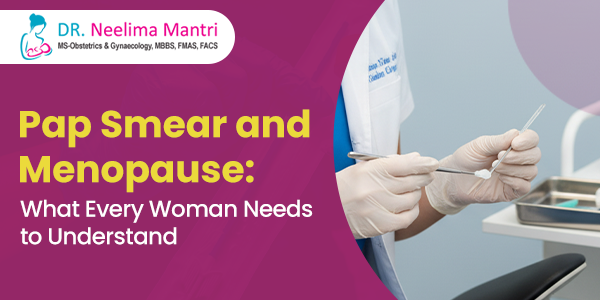
by Dr Neelima Mantri | Oct 6, 2025 | Blog, Female Gynaecologist
Many women assume that routine tests like a Pap smear are no longer required once menopause begins. The truth is that menopause introduces hormonal changes that can silently impact cervical health. Skipping screenings during this stage can allow risks to go undetected. Understanding the link between Pap smear and menopause is the first step toward long-term protection.
Cervical cancer does not pause with ageing
While fertility stops with menopause, the cervix remains just as susceptible to abnormal changes. Human papillomavirus can stay dormant in the body for years and may become active again when oestrogen levels drop. This reactivation risk is why a regular Pap test remains relevant for women past the age of fifty. The question Why is a Pap smear important during menopause? finds its answer in this continued vulnerability.
Changes in the cervix are harder to detect without testing
As oestrogen drops, the cervix may shrink slightly, and the tissues can become thinner and more fragile. These changes may make infections or precancerous conditions harder to detect during a basic pelvic exam. A Pap smear remains the most reliable method to examine cells for abnormalities in women who are experiencing or have completed menopause. Common symptoms linked to menopausal cervical health shifts include:
- Postmenopausal bleeding or spotting
- Vaginal discharge with unusual texture or colour
- Pain during intimacy or pelvic discomfort
- Persistent itching or dryness despite local treatment
- Infections that recur despite good hygiene and care
Pap smear timing should match your health history
Women above the age of sixty-five may not need a Pap test if they have had consistently normal results for over ten years. But for many who have missed regular check-ups or faced health changes, continuing screenings is wise. A detailed conversation with the best female gynaecologist in Mumbai can help decide the right timeline based on your individual case.
Your overall treatment journey matters too.
Managing Menopause Symptoms and Treatment in Mumbai must include regular assessments of both hormonal and reproductive health. From bone density to heart rhythm and cervical changes to mood swings, everything connects during this transition. The body continues to evolve through postmenopause, and that requires continued medical guidance.
Every woman deserves honest and personalised care
Some women may feel uncomfortable discussing intimate issues or asking about a Pap test during later years. Choosing the best gynaecologist in Mumbai makes those conversations easier and more productive. A good practitioner will always ensure you feel heard and supported during every stage of life.
Menopause is not the end of gynaecological care
Asking Why is a Pap smear important during menopause? Leads to answers that protect your future health. Do you know how menopause impacts cervical health? Ensures you stay aware of changes that deserve early medical attention. These questions are not just medical queries but essential reminders of how important self-awareness is during every phase.
For those seeking ongoing guidance across menopause and gynaecological health, Dr Neelima Mantri offers expert care and trusted insights tailored to your body’s evolving needs.
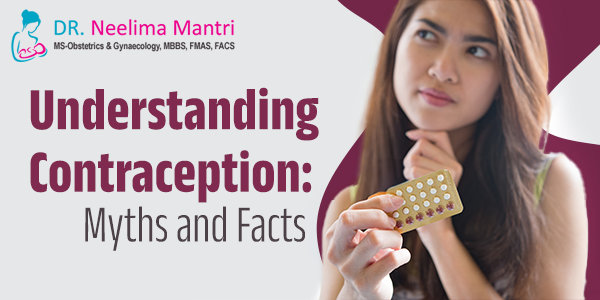
by Dr Neelima Mantri | Sep 16, 2025 | Blog, Female Gynaecologist
Contraception is one of the most common health topics discussed during gynaecology visits. Still, it remains surrounded by confusion and half-truths. Some people avoid it due to fear. Others follow advice passed from friend to friend without medical checks. This makes it harder for women to make safe and informed choices.
Many patients search for the best female gynaecologist in Mumbai, not just for treatment but for clear answers about birth control. Good care begins with the correct information. That is why this topic deserves more attention than it usually gets.
What Are the Common Myths About Contraception
Some believe that pills must be avoided because they cause long-term harm. Others think that skipping periods through pills leads to serious illness. Many also think that using contraception early in life affects future pregnancy. These are all false. If you ask what the common myths about contraception are, the list is long but not impossible to clear. Most myths come from limited knowledge. A qualified doctor will explain each option and help remove doubts through medical facts and tests.
Common Misconceptions About Contraception
One major misconception is that all forms of contraception cause weight gain. While some pills may lead to mild changes in appetite, they do not lead to permanent or uncontrollable weight issues. Another is the idea that using any method for a long time will harm the uterus.
The truth is that most methods do not affect the uterus in a harmful way. Some women also believe that birth control leads to hormonal damage. This is not true. In fact, some methods help correct hormonal imbalance. These are all common misconceptions about contraception, and clearing them allows women to take control of their health without fear.
Can Contraception Affect Fertility in the Long Run
The short answer is no. Most modern contraceptive methods are designed to be fully reversible. When stopped, the body usually returns to its natural cycle within weeks or months. Some women may face a delay in conception after stopping, but this is due to age or other health issues and not because of the method itself.
A few rare side effects may appear, but they do not block pregnancy in the long term. If you ask, can contraception affect fertility in the long run, the answer is clear when given by a trusted medical expert. A complete health check can clear doubts and offer peace of mind.
Why You Need the Right Guidance
Contraception must match your body, your age, and your life plan. What works for one person may not work for another. Some women choose daily pills while others prefer monthly injections. Some choose long-term devices while others want temporary options.
The best gynecologist in Mumbai will guide you through this step-by-step. They will ask about your cycle, test your hormone levels, and explain the effects of each method. This kind of personal care helps women choose what feels safe and right for them.
Who to Speak With for the Right Advice
Gynaecologists see patients of all ages with different needs. Some are newly married. Some are recovering from delivery. Some are planning to delay parenthood. The best female gynaecologist in Mumbai will make time to answer each question with honesty and patience. They will not rush you. They will help you understand the whole picture and guide you through side effects if they appear. Choosing the right doctor means you feel supported at every stage.
Contraception does not have to be confusing. With the correct facts and honest advice, you can make choices that fit your body and your life without fear. If you are looking for a doctor who takes the time to explain and support you, speak with Dr Neelima Mantri. Known as the best gynecologist in Mumbai, she helps women clear doubts, break myths, and choose safe methods that work. Her care makes space for open questions and confident decisions, especially when it comes to common misconceptions about contraception and long-term health.
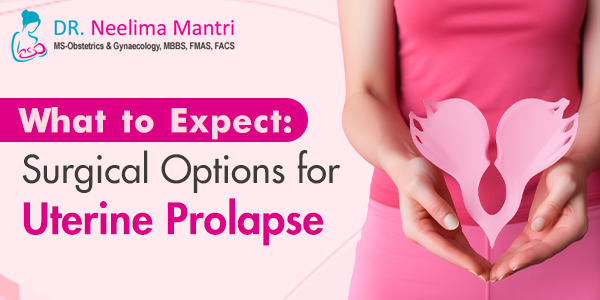
by Dr Neelima Mantri | Jul 14, 2025 | Blog, Female Gynaecologist
Uterine prolapse occurs when the uterus descends into the vagina. People are more likely to think that it is more common than they think. It may lead to pain, congestion, and urinary problems. In other women, it influences their day-to-day life. Surgery is the next option when exercises and support devices fail to work.
In case you are thinking of undergoing uterine prolapse surgery, this is what you should know. Being aware of your choices, the process of recovery, and what occurs during surgery can help you make the decision easier.
When Is Surgery Needed for Uterine Prolapse?
Mild prolapse does not require surgery. Vaginal pessaries and pelvic floor exercises can be useful. However, in case of continuous worsening of the symptoms, or when the uterus bulges out, surgery is the most appropriate. Women with difficulty in walking, lifting or emptying their bladder comfortably usually opt to have surgery. It aids the recovery of pelvic functioning and enhances the quality of life.
Types of Uterine Prolapse Surgery
There is no single method. The right option depends on your age, health, and whether you wish to keep your uterus. One method is vaginal hysterectomy. This involves removing the uterus through the vagina. It is one of the most common approaches for severe prolapse. Another option is uterine suspension. This restores the uterus to its original position using surgical mesh or your own tissue. This can be done through the vagina or by laparoscopy.
Both methods are effective. The choice depends on your condition and your goals. If you want to preserve your uterus, suspension might be advised. If you’re past childbearing and want long-term relief, hysterectomy is often suggested. If you’re exploring uterine prolapse surgery in Mumbai, ask your doctor about both options. A good gynaecologist will explain the pros and cons clearly.
How Successful Is Uterine Prolapse Surgery?
You may ask, How successful is uterine prolapse surgery? The answer is reassuring. Most women feel better soon after surgery. They notice less pressure. Urinary symptoms improve. Walking and daily activities become easier.
The success rate is high. Around 85 to 90 per cent of women see a clear improvement. For long-term results, it is important to follow post-surgery care instructions. Pelvic floor exercises remain useful even after surgery.
Is Uterine Prolapse Surgery Painful?
Pain is a common concern. You may wonder, Is uterine prolapse surgery painful? The procedure is done under anaesthesia. You will not feel anything during the operation.
After surgery, some discomfort is expected. Pain is managed with medicine. Most women stay in the hospital for one or two days. They walk slowly within 24 hours. Full recovery takes four to six weeks. Each week feels better than the last. You will be asked to avoid lifting, bending, and straining for a while. Sexual activity is paused during healing. Your doctor will give clear do’s and don’ts to follow at home.
Choose the Right Specialist
Surgery is only part of the process. Choosing the right doctor matters. You need someone who explains the procedure. Someone who supports you through recovery. Someone who takes time to listen. If you are looking for the best gynaecologist in Mumbai for prolapse treatment, consider Dr. Neelima Mantri.
She is known for her patient-first approach. She offers both surgical and non-surgical care, depending on what suits you best. Her team ensures a smooth experience, from consultation to follow-up. Women across Mumbai trust her for gynaecological issues, including prolapse care.
Make an Informed Decision
Surgery sounds big. But when done for the right reason, by the right doctor, it brings lasting relief. Ask questions. Understand your body. Know your options. Prolapse may feel overwhelming, but it can be fixed. The goal is to help you move freely, live confidently, and feel normal again. If you are ready to explore treatment, talk to a specialist today. Your next chapter starts with the right care.

by Dr Neelima Mantri | Jun 17, 2025 | Blog, Female Gynaecologist
Many women experience irregular periods at some point, leaving them wondering: what causes irregular menstruation, and is there anything they can do about it? The good news is that diet and lifestyle play a big role in menstrual health, and with the right adjustments, you can often help bring your cycle back on track. Let’s explore how.
What Causes Irregular Menstruation?
You should know what causes your periods to be irregular before making any changes. Some common causes are hormonal changes, stress, fast changes in weight, doing too much exercise, PCOS, issues with the thyroid or taking certain medications. Poor sleep or a bad diet can sometimes interfere with your body’s natural cycle.
When you know what causes irregular menstruation, you can start treating the problem itself, not just the symptoms. That’s where what you eat and how you live come into play.
Can diet help fix irregular periods?
It’s possible that you may ask if changing your diet can help your irregular periods. Absolutely. Your hormones, metabolism and reproductive health are all affected by your food choices. Eating more whole foods, fruits, vegetables, lean proteins, and healthy fats may naturally regulate your hormones.
Eating fewer processed foods, less sugar, and less caffeine may improve your sleep. Spinach, lentils and red meat are good to eat if you have heavy bleeding during irregular periods. In fact, following the right diet can help with irregular periods. It may assist your body’s natural cycle and help you stay regular over the long term.
Small Changes That Can Bring Big Results
Along with diet, making other lifestyle changes is very important. By practising yoga, meditating or engaging in mild exercise, you can lower the hormonal changes brought on by high cortisol. It’s important to get enough rest, keep your weight healthy and avoid extreme changes in your diet or exercise.
A regular walk every day is good for your blood and general health. Combining these changes with a healthy diet can help your periods become more regular.
How to Know When You Should See a Professional
Though diet and lifestyle changes work for several women, there are times when you should see a doctor. If your irregular periods do not improve, it’s important to see the best female gynaecologist in Mumbai. A competent doctor may discover if PCOS, thyroid problems or issues with reproductive health are present.
When you require Irregular Period Treatment Mumbai 10, a good gynaecologist will offer personal advice, correct diagnosis and a treatment plan that suits your body.
Your Partner in Women’s Health
If you’re having trouble with your menstrual cycle or need advice, Dr Neelima Mantri, a top Gynecologist In Mumbai, can assist you. She provides women in Mumbai with understanding and expert treatment for menstruation problems, hormone problems and reproductive health issues. To get the best irregular period treatment in Mumbai 10, make an appointment with Dr Neelima Mantri and begin your journey to a regular and healthy cycle.
Page 1 of 1112345...10...»Last »







